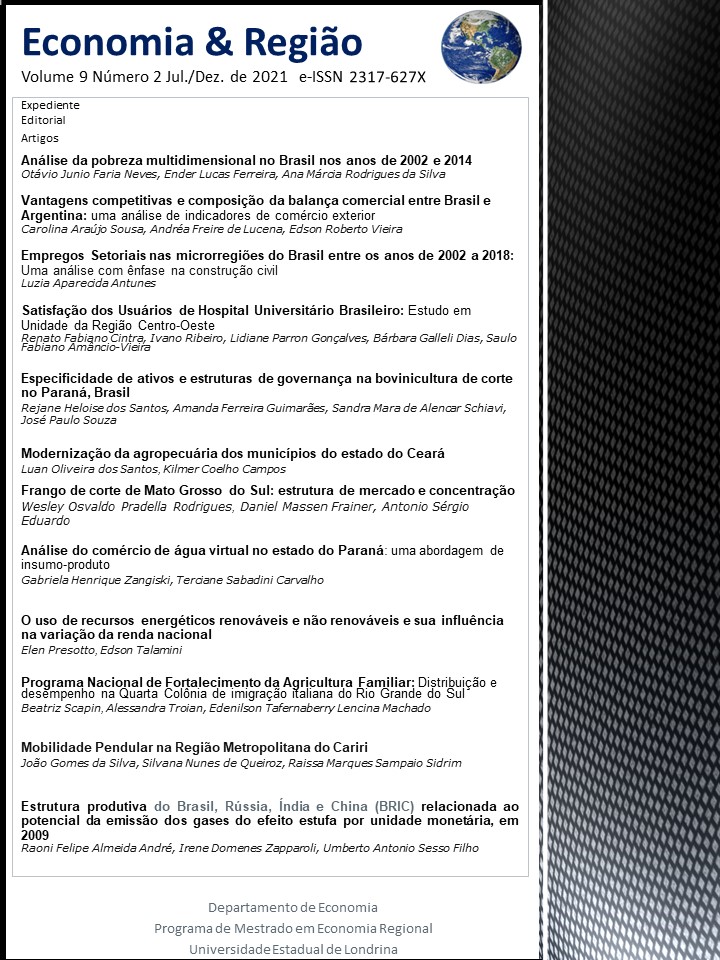The use of renewable and non-renewable energy resources and their influence on national income variation
DOI:
https://doi.org/10.5433/2317-627X.2021v9n2p195Keywords:
Production of energy, Income growth, Renewable energy, Non-renewable energyAbstract
The concern with the use of natural resources in the economy and the balance with the environment are a point of convergence and interest for the whole society. The objective of this study is to measure the impact of the production and consumption of renewable and nonrenewable energy, capital and labor in the face of Brazil's economic growth, seeking to show whether this growth was induced by public policies for renewable energy generation or not. To this end, two models were estimated using the Ordinary Least Squares method, for the period from 1970 to 2017. The results found demonstrate the positive influence of renewable energies in the face of variations in income and negative for variations in the production of nonrenewable energies. Increases of 1% in the production of renewable energy cause increases of 0.39% in income. The periods of the inversion of the energy matrix and the period marked by the incentive to the production of biofuels, proved to be significant to influence the variation of the national income.
Downloads
References
ANP, (Agência Nacional de Petróleo Gás Natural e Biocombustíveis). Agência Nacional de Petróleo, Gás Natural e Biocombustíveis. 2018.
AUSUBEL et al. Energy and Environment: The Light Path. Energy Systems and Policy; (United States), New York, v. 15:3, 1991.
BANCO MUNDIAL, T. W. B. World Development Indicators Database. 2018.
BOWDEN, N.; PAYNE, J. E. The causal relationship between U.S. energy consumption and real output: A disaggregated analysis. Journal of Policy Modeling, [s. l.], v. 31, n. 2, p. 180-188, 2009.
BRASIL. Lei no 9.478, de 6 de agosto de 1997. Dispõe sobre a política energética nacional, as atividades relativas ao monopólio do petróleo, institui o Conselho Nacional de Política Energética e a Agência Nacional do Petróleo e dá outras providências.1997. Disponível em:<http://www.planalto.gov.br/ccivil_03/leis/l9478.htm>. Acesso em: 7 jan. 2021.
BRASIL. Lei no 13.576, de 26 de Dezembro de 2017. Dispõe sobre a Política Nacional de Biocombustíveis (RenovaBio) e dá outras providências.2017.
BRASIL, (Empresa de Pesquisa Energética). Balanço Energético Nacional. 2018.
BRASIL, (Ministério de Minas e Energia). Análise de Conjuntura dos Biocombustíveis Ano 2018. Brasilia-DF.
CLEVELAND, C. J. Biophysical economics: Historical perspective and current research trends. Ecological Modelling, [s. l.], v. 38, n. 1-2, p. 47-73, 1987.
CONGLETON, R. D. Political institutions and pollution control. Review of Economics & Statistics, [s. l.], v. 74, n. 3, p. 412-421, 1992.
DAHL, C. A. Policies and International Energy Markets. Tulsa, Oklahoma.
EIA, (U.S. Energy Information Administration). Country analysis brief: Brazil. [s.l: s.n.].
ERDAL, G.; ERDAL, H.; ESENGÃœN, K. The causality between energy consumption and economic growth in Turkey. Energy Policy, [s. l.], v. 36, n. 10, p. 3838-3842, 2008.
HERRERIAS, M. J.; JOYEUX, R.; GIRARDIN, E. Short- and long-run causality between energy consumption and economic growth: Evidence across regions in China. Applied Energy, [s. l.], v. 112, p. 1483-1492, 2013.
LEE, C. C.; CHANG, C. P. Energy consumption and economic growth in Asian economies: A more comprehensive analysis using panel data. Resource and Energy Economics, [s. l.], v. 30, n. 1, p. 50-65, 2008.
LIU, X. Aggregate and disaggregate analysis on energy consumption and economic growth nexus in China. Environmental Science and Pollution Research, Verlag, v. 25, n. 26, p. 26512-26526, 2018.
MENEGAKI, A. N. Growth and renewable energy in Europe: A random effect model with evidence for neutrality hypothesis. Energy Economics, [s. l.], v. 33, n. 2, p. 257-263, 2011.
MUELLER, C. Avaliação de duas correntes da economia ambiental: escola neoclássica e a economia da sobrevivência, 1998.
OECD/IEA, (Organisation for Economic Co-operation and Development/International Energy Agency). Worldwide Trends in Energy Use and EfficiencyInternational Energy Agency. [s.l: s.n.], 2008.
PAYNE, J. E. On the dynamics of energy consumption and output in the US. Applied Energy, [s. l.], v. 86, n. 4, p. 575-577, 2009.
PEET, J. Economic Systems and Energy, Conceptual Overview. In: Encyclopedia of Energy. [s.l: s.n.]. p. 103-115.
SAES, B. M. Macroeconomia Ecológica: O Desenvolvimento De Abordagens E Modelos a Partir Da Economia Ecológica. 2015.
UNFCCC, (United Nations Framework Convention on Climate Change). The Paris Agreement | UNFCCC. 2021.
VEIGA, J. E. Da. Sustentabilidade: a legitimação de um novo valor. São Paulo: Editora Senac, 2010.
VICTOR, P. Questioning economic growth. Nature, [s. l.], v. 468, n. 7322, p. 370-371, 2010.
WOOLDRIDGE, J. M. Introdução à econometria: uma abordagem moderna. 4 ed ed. São Paulo: Cengage Learning, 2010.
ZAIDI, S.; GMIDEN, S.; SAIDI, K. How energy consumption affects economic development in select African countries. Quality & Quantity, [s. l.], v. 52, n. 1, p. 501-513, 2018.
ZHANG, X. P.; CHENG, X. M. Energy consumption, carbon emissions, and economic growth in China. Ecological Economics, [s. l.], v. 68, n. 10, p. 2706-2712, 2009.
Downloads
Published
How to Cite
Issue
Section
License
Copyright (c) 2021 Economia & Região

This work is licensed under a Creative Commons Attribution 4.0 International License.
Economia & Região adota a Licença Creative Commons Attribution CC-BY 4.0 International, portanto, os direitos autorais relativos aos artigos publicados são do(s) autor(es), que cedem à Revista Economia & Região o direito de exclusividade de primeira publicação.
Sob essa licença é possível: Compartilhar - copiar e redistribuir o material em qualquer suporte ou formato. Adaptar - remixar, transformar, e criar a partir do material, atribuindo o devido crédito e prover um link para a licença e indicar se mudanças foram feitas.




















